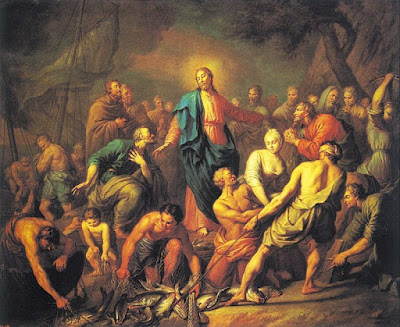 |
| “Wonderful Catch of Fish” by Anton Losenko, 1762 |
Let no one deceive himself.
If anyone among you considers himself wise in this age,
let him become a fool, so as to become wise.
For the wisdom of this world is foolishness in the eyes of God,
for it is written:
Paul or Apollos or Cephas,
or the world or life or death,
or the present or the future:
all belong to you, and you to Christ, and Christ to God.
-------------------------------------------
Commentary on 1 Cor 3:18-23
Responsorial Psalm: Psalm 24:1bc-2, 3-4ab, 5-6
the world and those who dwell in it.
For he founded it upon the seas
and established it upon the rivers.
R. To the Lord belongs the earth and all that fills it.
or who may stand in his holy place?
He whose hands are sinless, whose heart is clean,
who desires not what is vain.
R. To the Lord belongs the earth and all that fills it.
a reward from God his savior.
Such is the race that seeks for him,
that seeks the face of the God of Jacob.
R. To the Lord belongs the earth and all that fills it.
-------------------------------------------
Commentary on Ps 24:1bc-2, 3-4ab, 5-6
-------------------------------------------
Gospel: Luke 5:1-11
he was standing by the
He saw two boats there alongside the lake;
the fishermen had disembarked and were washing their nets.
Getting into one of the boats, the one belonging to Simon,
he asked him to put out a short distance from the shore.
Then he sat down and taught the crowds from the boat.
After he had finished speaking, he said to Simon,
“Put out into deep water and lower your nets for a catch.”
Simon said in reply,
“Master, we have worked hard all night and have caught nothing,
but at your command I will lower the nets.”
When they had done this, they caught a great number of fish
and their nets were tearing.
They signaled to their partners in the other boat
to come to help them.
They came and filled both boats
so that the boats were in danger of sinking.
When Simon Peter saw this, he fell at the knees of Jesus and said,
“Depart from me, Lord, for I am a sinful man.”
For astonishment at the catch of fish they had made seized him
and all those with him,
and likewise James and John, the sons of Zebedee,
who were partners of Simon.
Jesus said to Simon, “Do not be afraid;
from now on you will be catching men.”
When they brought their boats to the shore,
they left everything and followed him.
------------------------------------------------
Commentary on Lk 5:1-11
------------------------------------------------
Reflection:
When Simon-Peter recognized Jesus as the Messiah following the great catch of fish, we are told “he fell at the knees of Jesus.” Scripture did not say if he fell prostrate, or simply to his knees, but what is clear is that he recognized Jesus, and realized that he was in a sacred space. The Lord’s presence made it so.
I recently attended Mass in another town, in another diocese. It was a church in which reforms had been made. The tabernacle had been moved out of the sanctuary and placed in an adjoining chapel, and the kneelers had been removed. When people arrived, there was no genuflection, when they celebrated the Mass, even making Christ present in the Eucharist, there was no sense of the space being sacred, sanctified for worship. When contrasted with St. Thomas the Apostle, here in Ann Arbor where the tabernacle is central to our space and the sense that, as the Latin inscription around the dome above the sanctuary says “This is nothing more than the house of God and the gate of Heaven” (Genesis 28:17), there was a feeling that something important was missing. Yes the people were inviting and, with the exception of kneeling during the Liturgy of the Eucharist, the Mass was a celebration. But that feeling of sacred space was achingly missing.
When we become complacent, accepting Christ as merely another friend among friends, our own sense of holiness suffers. When we forget that what happens at the Eucharist is no less miraculous than the multiplication of the loaves, or the miraculous catch of fish, we lose our sense of awe and the appreciation for what the Lord has done. We lose our faith in what he is capable of doing for us.
Today’s Gospel reminds us that where Jesus is truly present, that space becomes sacred space, due our respect and reverence. We must never forget that the building itself is not “the church” but our reverence as a people of God makes it so.
When we become complacent, accepting Christ as merely another friend among friends, our own sense of holiness suffers. When we forget that what happens at the Eucharist is no less miraculous than the multiplication of the loaves, or the miraculous catch of fish, we lose our sense of awe and the appreciation for what the Lord has done. We lose our faith in what he is capable of doing for us.
Today’s Gospel reminds us that where Jesus is truly present, that space becomes sacred space, due our respect and reverence. We must never forget that the building itself is not “the church” but our reverence as a people of God makes it so.
[1] The picture used today is “Wonderful Catch of Fish” by Anton Losenko, 1762.
[2] S.S. Commemoratio
[3] The readings are taken from the New American Bible, with the exception of the psalm and its response which were developed by the International Committee for English in Liturgy (ICEL). This republication is not authorized by USCCB and is for private use only.
[4] NAB footnote on 1 Corinthians 3:21-23.



